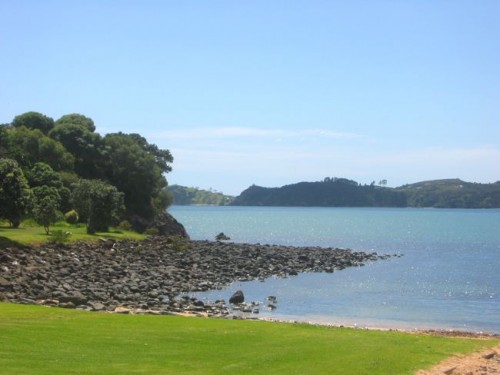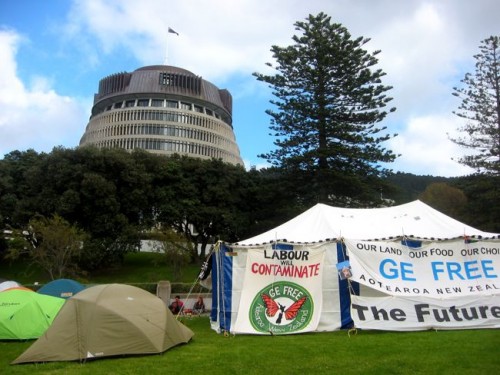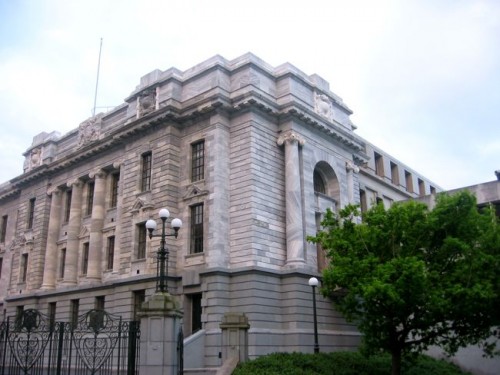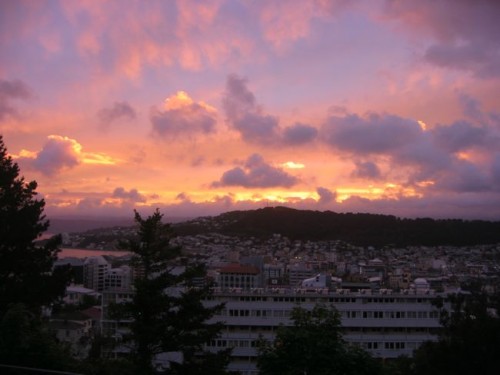Today is Waitangi Day – New Zealand’s version of Nation Day or the 4th of July.
As an outsider, I find Waitangi Day a most peculiar holiday, because it isn’t a celebration. It is, at best, a sort of uneasy acknowledgement of the beginnings of New Zealand as a nation.
This is my understanding of Waitangi Day:
Waitangi Day specifically commemorates the signing of the Treaty of Waitangi at Waitangi in the Bay of Islands on 6 Feb 1840.
The Treaty of Waitangi is to New Zealand what the Magna Carta is to the UK, or the Declaration of Independence is the US: it’s our founding document.
In some ways, it’s a good founding document. It’s short, and simple. It did three basic things: it establishes a British governorship over NZ (the NZ government essentially inherited this governorship), recognised that the Maori owned NZ, and had a right to their land and properties, and, finally, gave Maori the rights of British citizens.
Well, sort of. At the same time, it’s a terrible founding document.
You see, the problem with the Treaty of Waitangi is that it wasn’t written by experienced treaty writers. It wasn’t written to be a nation’s founding document. And, worst of all, it was translated into the language of the most important half of the signers (the local Maori) by people who weren’t translators, and didn’t speak the language they were translating well.
So the English and Maori versions of the Treaty say isn’t the same thing. What the Maori chiefs who signed the Treaty probably thought they were getting and giving, isn’t what the British signees thought they were getting and giving.
Talk about a recipe for disaster!
To make it worse, it wasn’t like every single Maori chief in NZ signed the Treaty: a small group of chiefs in the Far North of New Zealand signed it. And quite a few Far North chiefs refused to sign it.
And after the initial signing of the Treaty, copies of it (many of which said different things than the original Treaty) were taken around New Zealand for other chiefs to sign. But many, many chiefs didn’t sign it, and the initial problem with the translations not agreeing was compounded.
And despite the Treaty recognising that the Maori owned the land, much of it was still bought at unfair prices, or flat-out stolen, over the next few decades.
So today Waitangi Day is not a celebration. Depending on where you stand, it is source of anger, or grief, or guilt, or frustration, or (at the best) indifference. Very few people appreciate Waitingi Day as anything more than a day off work.
An annual commemoration is held at the Treaty Grounds at Waitangi where the Treaty was signed. As often as not the Prime Minister is harrassed, shouted at, and has to be rushed away from the event by security. Sometimes members of the Royal Family, as representatives of the Commonwealth, attend and experience the same sentiments. In one particularly memorable event, the Queen attended Waitangi Day and was treated to the ultimate traditional Maori insult by a protestor: the whakapohane.
Yes.
The Queen got mooned.
There are also commemorations in Wellington at the Beehive (the government offices) and the Parliament buildings next door. They are just as fraught.
So today, everyone will be off work, but no one will really be celebrating. Instead we’ll be wondering: did we get it right? Can we do better? Where to now?







Thanks for sharing. Sad to say, I don’t know much about NZ history! it’s good to learn 🙂
You’re welcome. Why is it sad that you don’t know much about NZ history? It is a rather small, obscure subject in many ways!
I know nothing about New Zealand’s history, so this article was every interesting to me. Thanks for having posted it.
You’re welcome. I tried to keep it simple enough that the non-Kiwi’s wouldn’t be ridiculously confused without being too simple, so I hope I got that balance right.
“did we get it right? Can we do better? Where to now?”
There are worse questions to be asking oneself.
I understand that part of the motivation for negotiating the treaty on the British side was to have a legal reason to “protect” New Zealand from the French.
Indeed there are worse questions. I’d like to see a national holiday for NZ that was about celebration too – that really marked all the things you’ve got right (and not just being awesomely good at dying in/making other people die in foreign wars)
Given France’s track record regarding the treatment of colonised peoples, you could argue that it was a benefit for the Maori too.
France didn’t do quite so badly in the Pacific, but most Pacific islands still saw GB as the preferred colonizer (if they were to be colonized). Hawaii even petitioned GB to annex Hawaii at one point. In NZ the colonizers (more than a little patronizingly) bragged to the rest of the world that “they had the best natives, and treated them best too”.
I think you’ve nailed it. As I see it, it is mostly a day for having the ‘discussions’ about the bits that have been got wrong, and sharing a few sighs of relief that the Treaty did as well as it did. Things could have been a lot worse.
I’m glad I have the approval of a ‘proper’ Kiwi. And indeed, things could have been worse.
I remember my first waitangi day, in London. I was thoroughly coached on how to pass myself off as a kiwi at the big celebrations, but in retrospect I think it was quite a joke.
Like the others said , it isn’t perfect but it seems to me that the kiwis have less to be ashamed for than other nations of white invaders…
I believe the London celebrations are quite a bit ‘jollier’ than the ones here. I’d love to see you as a Kiwi 😉
Doesn’t seem too different from the treaties signed in the US with various native groups. “Oh hey, how about we sign a treaty and you give us some of your stuff and we’ll all be friends.” Followed by either a) “We can have this, right?” “Uh, I guess?” “Great!” *take* or b) “We can have this, right?” “Uh, no?” “That’s sad. But have this blanket as a token of friendship.” *take*
Did you not learn about the Treaty of Waitangi while you were here? At least with the Treaty it doesn’t seem like most of the mistakes were intentional – they didn’t mean to intentionally mislead the chiefs with the translation, and they didn’t mean for the land to be bought at ridiculous prices (well, mostly).
Considering the history of colonialism in general, I’m still dubious, but maybe some of it was just out of sheer ignorance. I did learn about the treaty (I think a lot from you during a visit to Te Papa) and I can’t help but think someone wasn’t exactly doing due diligence in vetting the translation.
I do think it’s admirable that the day is remembered and thought/acted upon, which is loads more than the US really does for any disenfranchised native peoples.
Oh no! You referenced smallpox blankets!
But you know, I thought the same thing, initially as well. After all, if we don’t relate new ideas to previous experiences, we risk separating ourselves from the feelings that make it all important, and propel us to try to not cause something else just like it. (in this case: sadness, even disgust, nostalgia)
I wish I remember more of my Canadian history classes from when I lived there as a kid. If I remember, it was gentler, more akin to the NZ experience.
Very interesting post!
I agree, there are worse things to do than spend a day thinking about what went wrong in the past and what we could do better in the future (I “like” Remembrance Day for much the same reason.)
If Canada Day were a celebration of the western treaty-signings, it wouldn’t be much different, I think. Except that pretty much *all* the chiefs did eventually sign because at that point the buffalo were gone (having been wiped out by the American government) and it was sign or starve. That doesn’t make the way the treaties were administrated any less horrific.
I definitely agree that there are worse things to do with the day. However, the day is frequently more divisive than inclusive: it reopens old wounds without really providing a way to address and heal them in a constructive manner.
There aren’t enough national holidays in New Zealand that are really about coming together to celebrate what they have that is really amazing (and I may be biased, but NZ is a pretty darn awesome country that has a LOT to celebrate) to balance the weight of Waitangi Day. No one understands or cares about Labour Day or the Queens Birthday – the only National Holiday that people can really feel proud about is ANZAC day. So instead they channel all that national pride into exhaustive navel gazing and getting a little too worked up about rugby. At least the finally won the Rugby World Cup again last year!
Beautifully put. It is interesting to hear an insideouters view of something we take for granted. Most thought provoking 🙂
Insideouter – I like that! Thank you
Very well put. The good thing is that most people in NZ have a good idea of the issues.
Now I live in Australia, I get to experience “Australia Day” – which is a day of hard drinking, racism, covering everything with aussie flags and chanting ‘Oi oi oi’.
If you point out that the aborigines call it “Invasion Day” you get an outpouring of vitriol and hatred. My fave was someone saying that they should get over it and just celebrate the wonderful place that Australia is.
This person obviously has never been to Cunnamulla. :-p
Waitangi Day isn’t perfect, but it isn’t as bad as Australia Day.
I’ve heard that Waitangi Day celebrations abroad are much less contemplative and respectful, and much more celebratory.
I don’t think everyone in Oz is quite so callous about Australia Day. Steph at 3 Hours Past wrote a thoughtful post on her (equally sort-of-outsider) perspective on Australia Day.
What a fascinating post. I had no idea that was how New Zealand came into being. What an interesting way of observing the occasion, too…far more honest than, well, here. I am quite American, but there is a part of me that is ashamed that the ground that I live on was stolen.
I wonder how many citizens of any country can say that they are living on land that wasn’t stolen at some point or another, and what does that say about humanity?
Thought-provoking, indeed,
Natalie
I guess ‘stolen’ really depends on what you count as theft. Many Native American tribes were constantly fighting and taking land from each other. The Maori iwi (tribes) also did the same thing. And in Hawaii there were at least three waves of immigration from other Pacific islands (unknown, Marqueses and then Tahiti in that order, if I remember correctly), and each wave subjugated the one before them, so that the chiefs in Hawaii when Cook arrived were all descendants of the Tahitians, and the original group were almost wiped out, and the ones that remained were slaves.
I think we’re all the descendants of ‘land thiefs’, but at the same time, we aren’t responsible for our ancestors actions. We can’t be. We’re only responsible for what we do, and think, and make of what we have.
Very well said–both your original post and this. The period and place I study in American history was such a vibrant–and scary–one in terms of American Indian and colonial conflict that I think it cheapens it terribly to portray it as a simple story of “theft.” I suppose that background causes me to question and wonder about the nuance of all the stories like this–wondering at how years of uncertain conflict must have felt at the time. Not that everything done by either side was honorable. Of course, what are we but human? And what can we do but move forward?
Yes it’s hard as the inheritors of a system that was flawed to begin with. Being someone who has benefited from an unfair system.
Being an Aussie, we have our own set of circumstances to deal with. There have been terrible things done in the past that we can’t ignore. And we are all finding our way forward. (hell I sound like the Prime Minister)
But not all Aussies are racist, hard drinking or yobbos. Some are but TV shows us the worst, but there are many good people out there trying to make a difference.
I like our national flag but I also respect the Aboriginal and Torres Strait Islander flags. My family and friends have a myriad of backgrounds but we are all here now and we treat each other with liking and respect.
I haven’t been to an Australia Day party for a good few years now, but friends used to have great breakfasts they’d invite people to for weeks before hand – new arrivals and old friends. It was about welcoming, friendship, and being decent and respectful to each other.
Now I tend to spend the day quietly being thankful for the blessings we have. And we have an awful lot.
This is probably the best summary of Waitangi Day I’ve seen. I suspect you have a better grasp of Waitangi Day and the associated issues than a lot of people who were born here!
I think sometimes being from outside helps to really see what goes on. And I did write my undergraduate thesis on comparative development in NZ & Fiji, and how their differing attitudes towards issues of native rights have shaped their politics and advances. Yes, I had a life before textiles!
Wow. I had no idea what the beginnings of NZ were. Previously, all I really knew about NZ could be summed up as follows: 1) There are kiwi birds. 2) Lord of the Rings was filmed there. 3) You live there.
Thanks for sharing your excellent beginner’s summary of the events, and for helping to start me off on a new set of Wikipedia trails about NZ history. Would that we could all be so thoughtful about what makes our lives as they are now, possible.
You’re welcome! I hope you enjoyed the exploring. I’m afraid I find the Wikipedia articles on the Treaty a good way to get bored really quickly.
And your knowledge of NZ isn’t bad. At least you knew LotR was filmed in NZ, not Australia, so you’re doing better than the New York Times. 😉
Ooh! Don’t forget about Flight of the Concords!